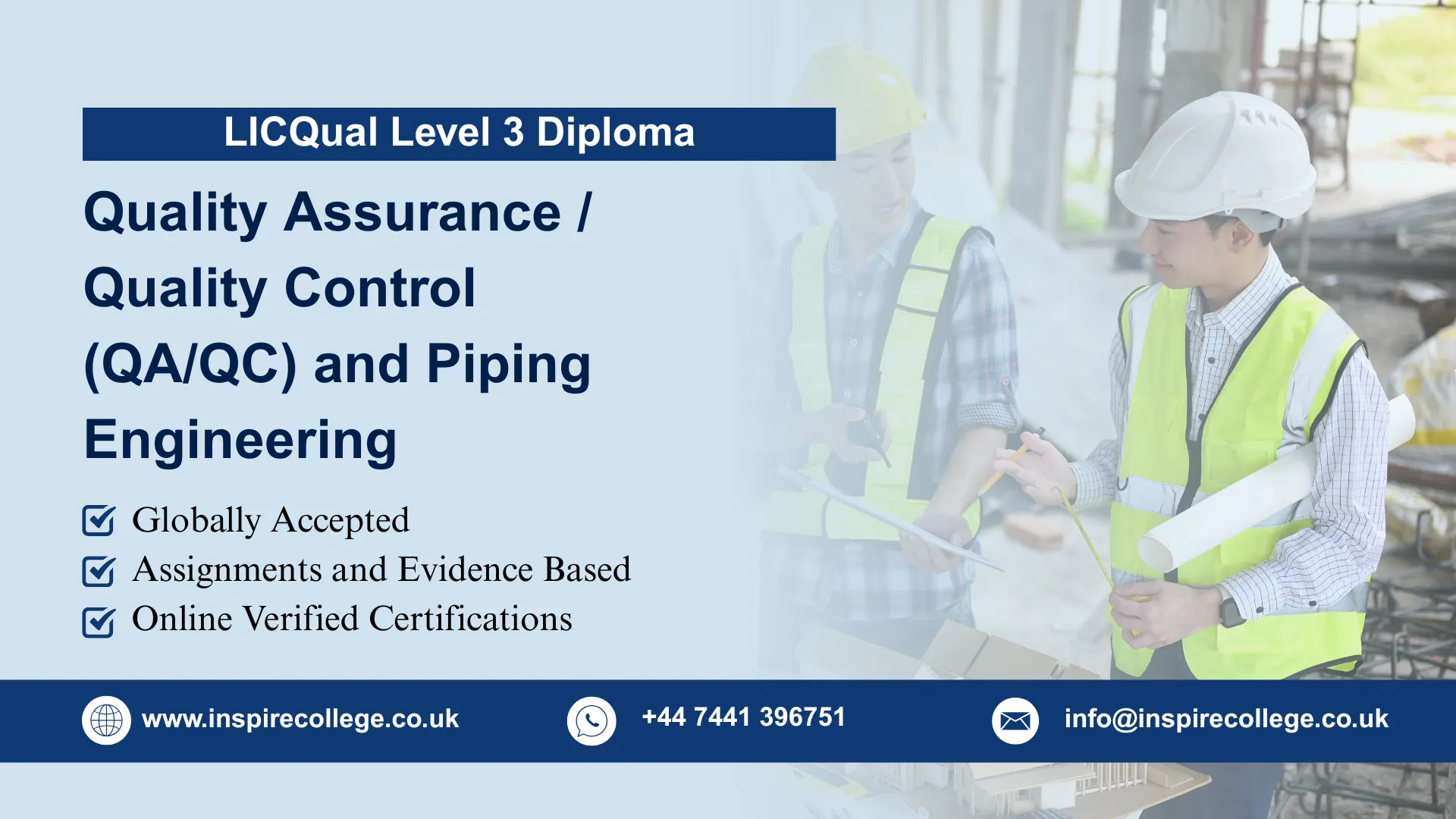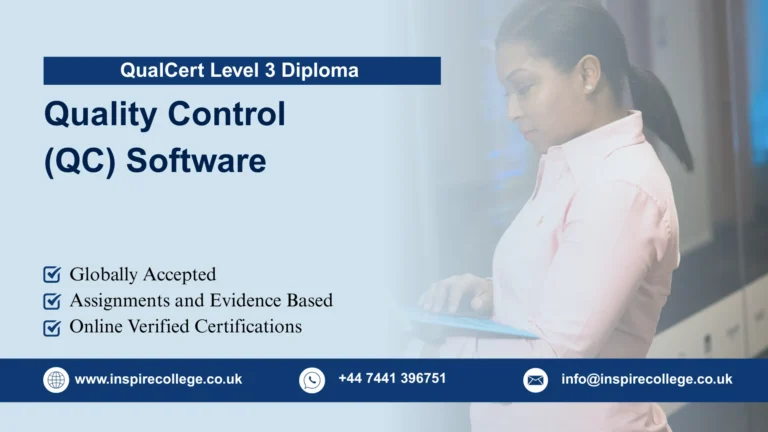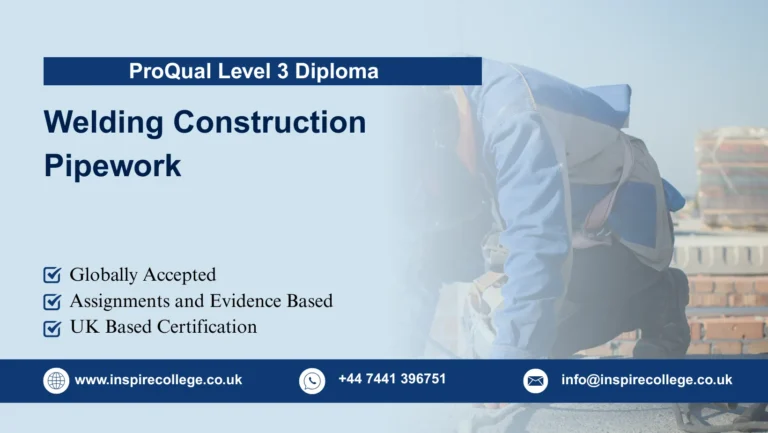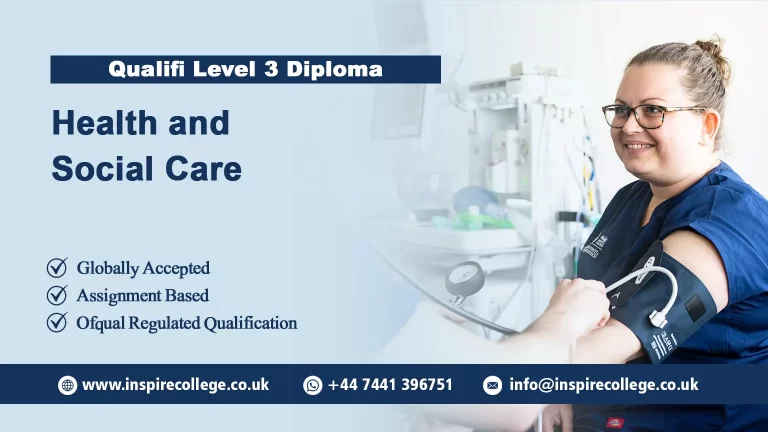
LICQual Level 3 Diploma in Quality Assurance / Quality Control (QA/QC) and Piping Engineering
The LICQual Level 3 Diploma in Quality Assurance / Quality Control (QA/QC) and Piping Engineering is a specialized qualification that provides learners with a strong foundation in the principles, practices, and applications of QA/QC and piping systems. In today’s competitive industrial sectors, the role of QA/QC and piping engineering is critical for ensuring that projects meet safety, reliability, and international compliance standards. LICQual Level 3 Diploma in Quality Assurance / Quality Control (QA/QC) and Piping Engineering has been designed to equip learners with essential knowledge and hands-on skills that are directly aligned with industry demands, making it highly relevant for professionals seeking to build or advance a career in this field.
LICQual Level 3 Diploma in Quality Assurance / Quality Control (QA/QC) and Piping Engineering introduces learners to the fundamentals of piping engineering, including design, layout, material selection, and fabrication processes. It also focuses on key quality assurance and quality control practices, covering topics such as inspection techniques, documentation, welding quality control, and the implementation of international standards like ASME, API, ASTM, and ISO. By developing a clear understanding of these frameworks, learners will be able to contribute effectively to industrial projects while ensuring compliance, safety, and efficiency.
A unique aspect of LICQual Level 3 Diploma in Quality Assurance / Quality Control (QA/QC) and Piping Engineering is its practical orientation. Learners will not only study piping drawings and specifications but also gain the ability to interpret them accurately for inspection and quality purposes. Training in QA/QC documentation, inspection planning, and non-destructive testing methods ensures that participants can apply their knowledge in real-world industrial scenarios. Whether working in oil and gas, petrochemicals, construction, or power generation, graduates of this program will possess the skills needed to carry out inspections, maintain quality standards, and support project execution with confidence.
LICQual Level 3 Diploma in Quality Assurance / Quality Control (QA/QC) and Piping Engineering is suitable for engineering graduates, diploma holders, welders, fabricators, technicians, and professionals already working in industrial sectors who wish to enhance their expertise. It also provides an entry point for individuals with a technical background who aspire to begin a career in QA/QC and piping inspection.
By completing the LICQual Level 3 Diploma in QA/QC and Piping Engineering, learners will gain industry-recognized qualifications that enhance employability both locally and internationally. LICQual Level 3 Diploma in Quality Assurance / Quality Control (QA/QC) and Piping Engineeringnot only opens the door to immediate career opportunities but also serves as a stepping stone for higher-level certifications and advanced professional development in QA/QC and piping inspection.
To be eligible for admission into the LICQual Level 3 Diploma in Quality Assurance / Quality Control (QA/QC) and Piping Engineering, applicants must meet specific entry criteria. These requirements ensure learners are adequately prepared to engage effectively with the course content, practical exercises, and assessments. The criteria are designed to maintain academic and professional standards while providing accessibility for individuals from diverse educational and professional backgrounds.
- Age Requirement:
- Applicants must be at least 18 years old at the time of enrollment.
- This minimum age ensures learners possess the maturity, focus, and professional readiness required to undertake a technical qualification.
- It also guarantees that candidates can responsibly apply their acquired skills in professional and industrial environments.
- Educational Requirements:
- A high school diploma (Matriculation or an equivalent qualification) is the minimum requirement for entry.
- Preference is given to candidates with prior educational backgrounds in science, mathematics, engineering, technical trades, or vocational training.
- These subjects provide a strong foundation for understanding principles of piping engineering, quality assurance, and quality control processes.
- Professional or Technical Experience (Optional but Advantageous):
- While prior industry experience is not mandatory, candidates with hands-on exposure in mechanical, civil, or industrial sectors will benefit significantly.
- Experience in areas such as piping systems, welding, fabrication, construction, inspection, or quality assurance enhances practical understanding.
- Learners with prior work experience can more effectively connect theoretical knowledge to real-world applications, improving skill retention and competency in QA/QC practices.
- English Language Proficiency:
- Applicants are expected to demonstrate a basic level of English proficiency, particularly in reading, writing, and comprehension.
- Proficiency ensures learners can understand technical documentation, international standards, and structured assessments.
- Competence in English also enables effective participation in lectures, practical exercises, and industry-standard reporting practices.
In summary, the entry requirements for the LICQual Level 3 Diploma in QA/QC and Piping Engineering are designed to ensure that learners have the necessary academic foundation, personal maturity, and language skills to succeed. The program is accessible to individuals starting their careers, while also offering opportunities for those with prior technical or industrial experience to enhance their expertise, develop specialized skills, and progress toward professional roles in quality assurance, quality control, and piping engineering.
Mandatory Units
The LICQual Level 3 Diploma in Quality Assurance / Quality Control (QA/QC) and Piping Engineering, achieve the qualification candidates must achieve all of the mandatory units:
Mandatory Units
By completing LICQual Level 3 Diploma in Quality Assurance / Quality Control (QA/QC) and Piping Engineering, learners will gain a strong foundation in QA/QC principles, international standards, welding inspection, piping materials, and non-destructive testing (NDT) methods. They will also develop the ability to prepare and manage quality documentation, inspection reports, and audit records that meet global compliance requirements.
Unit 1: Introduction to QA/QC and Piping Engineering
By the end of this unit, learners will be able to:
- Define and explain the fundamental concepts of Quality Assurance (QA) and Quality Control (QC).
- Describe the scope, roles, and responsibilities of QA/QC professionals in engineering projects.
- Identify the key components, functions, and layouts of piping systems.
- Explain the importance of quality control in achieving project efficiency, safety, and regulatory compliance.
- Recognize entry-level and advanced career pathways within the QA/QC and piping engineering profession.
Unit 2: Piping Materials, Components, and Fabrication
By the end of this unit, learners will be able to:
- Identify a variety of piping materials, their classifications, and industrial applications.
- Describe the functions and uses of valves, fittings, flanges, gaskets, and other piping components.
- Demonstrate understanding of basic fabrication processes including cutting, welding, bending, and assembling.
- Interpret and apply basic isometric drawings, shop sketches, and fabrication documentation.
- Ensure that piping fabrication processes meet technical specifications and quality standards.
Unit 3: International Codes and Standards in QA/QC and Piping
By the end of this unit, learners will be able to:
- Identify and explain the relevance of international codes and standards such as ASME, ASTM, API, and ISO.
- Apply relevant codes and standards to inspection, fabrication, and testing procedures.
- Evaluate engineering drawings, documentation, and reports in line with recognized quality benchmarks.
- Recognize the role of regulatory compliance and certification in international projects.
- Use codes and standards as a reference to support effective quality decision-making.
Unit 4: Welding Processes and Visual Inspection Techniques
By the end of this unit, learners will be able to:
- Explain common welding processes such as SMAW, GTAW, GMAW, and FCAW.
- Identify welding symbols, joint designs, and common types of weld defects.
- Carry out basic visual inspection of welds using standard inspection procedures.
- Understand and interpret essential welding documentation, including WPS (Welding Procedure Specification) and WPQ (Welder Performance Qualification).
- Ensure welding operations meet industry quality, safety, and compliance requirements.
Unit 5: Non-Destructive Testing (NDT) Methods
By the end of this unit, learners will be able to:
- Describe the principles and applications of key NDT methods: Ultrasonic Testing (UT), Radiographic Testing (RT), Penetrant Testing (PT), Magnetic Particle Testing (MT), and Visual Testing (VT).
- Select appropriate NDT techniques based on material type, defect type, and project requirements.
- Interpret and analyze NDT results to identify defects, flaws, or non-conformities.
- Apply relevant safety standards and practices during NDT inspection procedures.
- Evaluate the strengths, limitations, and suitability of each NDT method in quality control.
Unit 6: QA/QC Documentation and Reporting
By the end of this unit, learners will be able to:
- Prepare structured inspection reports, checklists, and Inspection Test Plans (ITPs) aligned with project requirements.
- Maintain proper traceability records for materials, welding activities, and inspection outcomes.
- Identify, document, and report non-conformities in accordance with quality standards.
- Support and contribute to internal and external quality audits through accurate record-keeping.
- Demonstrate professional communication and reporting skills within QA/QC frameworks.
The LICQual Level 3 Diploma in Quality Assurance / Quality Control (QA/QC) and Piping Engineering has been carefully designed for learners and professionals who want to establish, strengthen, or advance their careers in the specialized domains of quality assurance, quality control, inspection, and piping systems. This qualification caters to a wide range of individuals across the engineering and industrial sectors, making it a versatile and globally relevant program.
LICQual Level 3 Diploma in Quality Assurance / Quality Control (QA/QC) and Piping Engineeringis particularly suitable for:
- Fresh Graduates: Individuals with academic backgrounds in technical, mechanical, or engineering disciplines who aspire to enter the QA/QC or piping engineering industry. This diploma serves as a strong entry point by providing practical skills and internationally aligned knowledge.
- Working Professionals: Those already employed in engineering, construction, or manufacturing who want to upgrade their qualifications, improve career prospects, and earn globally recognized certification in QA/QC practices, codes, and standards.
- Technicians and Supervisors: Personnel engaged in welding, fabrication, piping installation, or construction projects who wish to enhance their inspection skills, strengthen their understanding of quality management, and ensure compliance with international standards.
- Engineers and Site Inspectors: Practicing engineers or field inspectors who want to expand their knowledge in areas such as international codes (ASME, ASTM, API, ISO), welding inspection, documentation, and non-destructive testing (NDT) techniques.
- Career Switchers: Individuals with relevant technical or industrial experience looking to transition into the growing fields of quality assurance, quality control, and piping inspection, particularly within industries such as oil and gas, petrochemicals, energy, power plants, and large-scale infrastructure projects.
Whether you are just beginning your professional journey or are an experienced practitioner aiming for career advancement, the LICQual Level 3 Diploma in Quality Assurance / Quality Control (QA/QC) and Piping Engineering equips you with the essential knowledge, skills, and globally recognized competencies required to thrive in QA/QC and piping engineering roles worldwide.ith confidence in any high-risk or high-performance electrical environment.
Register Now
FAQs for LICQual Level 3 Diploma in Quality Assurance / Quality Control (QA/QC) and Piping Engineering






